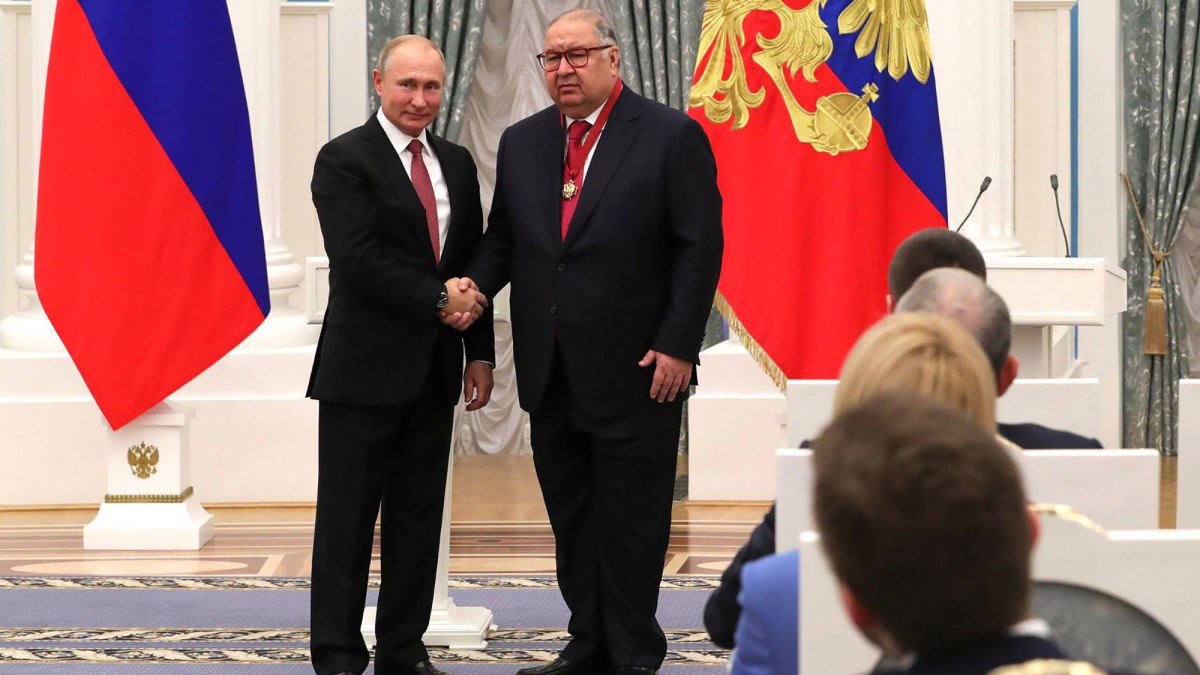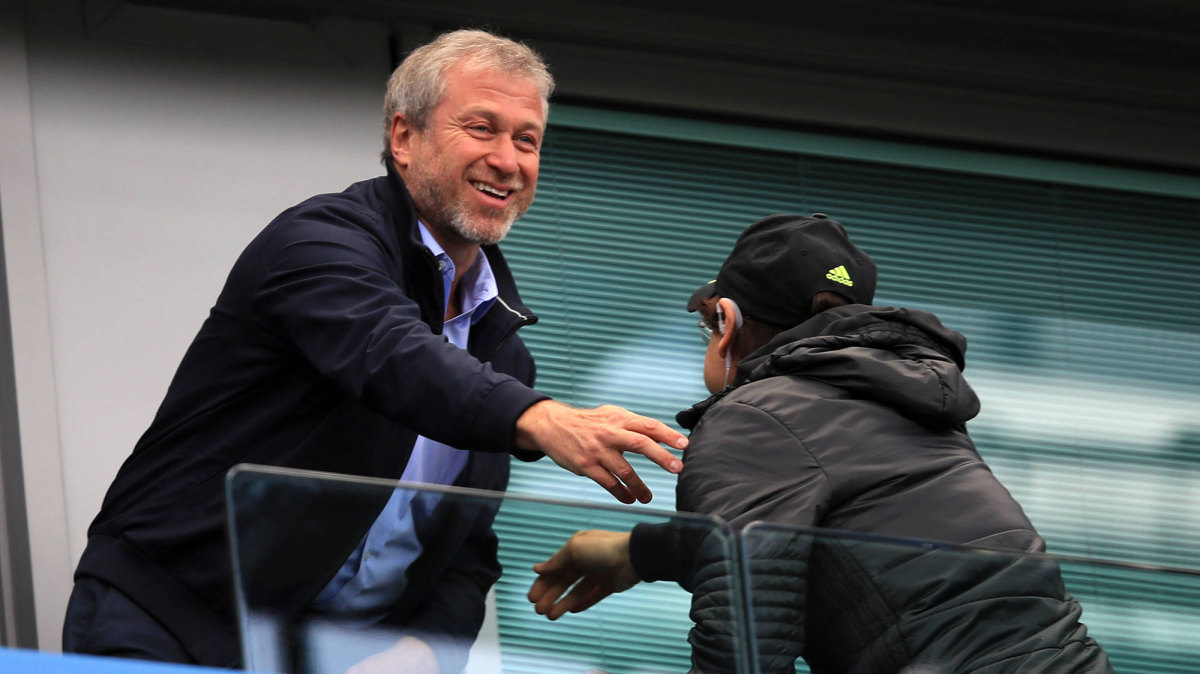Everton’s Stand, Chelsea’s Sale and the Russian Invasion’s Premier League Fallout
As the exact details of the U.K.’s sanctions package against Russia continue to be worked out, the ramifications are beginning to be felt through English football, with Everton severing ties with Alisher Usmanov and Roman Abramovich apparently looking to sell Chelsea.
Usmanov, an Uzbek-born Russian metals tycoon, has had his assets frozen by the European Union, although no sanction has yet been imposed by the U.K., and he insists claims he is linked to Vladimir Putin are “false and defamatory.” He is a close business associate of Everton owner Farhad Moshiri, and, although he does not own any share in the club, he is involved in a number of sponsorship deals.
His company USM Holdings has had a £12 million ($16 million) per year sponsorship deal of Everton’s Finch Farm training ground since 2017 and paid £30 million for an option on first naming rights at the new stadium being built at Bramley Dock. Everton’s women’s team is sponsored by MegaFon, of which Usmanov is the majority shareholder, and Yota, a subsidiary. Moshiri has a stake in both USM and MegaFon. USM, MegaFon and Yota branding will be removed from the stadium and training ground in the coming days.

Everton’s most recent accounts, for 2019–20, showed that it generated £63.7 million in sponsorship, of which at least half must have come directly from Usmanov. Although the club has insisted that construction work on the new £500 million stadium will go ahead as planned and that financing for that is not affected, a loss of £30 million to £35 million a year will be felt—and that’s without taking into account what the impact on Moshiri’s business may be. For a club that's just one point clear of the relegation zone, that could potentially have far-reaching ramifications on its future.
Everton, as a club, had already taken a strong stance against Russia's invasion of Ukraine, putting the full weight of its public support behind its Ukrainian defender, Vitaliy Mykolenko.
“Everyone at Everton remains shocked and saddened by the appalling events unfolding in Ukraine,” Everton wrote in a statement. “This tragic situation must end as soon as possible, and any further loss of life must be avoided. The players, coaching staff and everyone working at Everton is providing full support to our player Vitaliy Mykolenko and his family and will continue to do so. The club can confirm that it has suspended with immediate effect all commercial sponsorship arrangements with the Russian companies USM, MegaFon and Yota.”
Frank Lampard has been discussing Ukrainian defender Vitaliy Mykolenko and Everton's decision to suspend all commercial sponsorship arrangements with Russian companies...⤵ pic.twitter.com/xDEG1KcXyh
— Sky Sports News (@SkySportsNews) March 2, 2022
It turns out, meanwhile, that Abramovich’s announcement on Saturday that he was handing “stewardship and care” of the club over to its trustees—they are yet to accept—was a signal he was open to selling after 19 years in charge. Swiss billionaire Hansjörg Wyss told Swiss newspaper Blick that Abramovich “wants to get rid of Chelsea quickly,” and indeed on Wednesday, Abramovich put out a statement confirming that he will be selling the club.
It’s believed Abramovich's advisers at the Raine Group are expected to issue letters to prospective bidders on Wednesday, with a deadline set for indicative bids in mid-March. Eight billionaires have been earmarked as potential buyers. What sort of figure Abramovich would accept for the club is unclear, with initial suggestions that the price would be £3 billion, although that figure is likely to drop if the pressure on Abramovich grows.
Even without the present situation, £3 billion would seem expensive for a club valued by the football financial expert Kieran Maguire at £1.2 billion in 2020. Stamford Bridge, Chelsea’s home, is relatively small for a superclub, and attempts to move or redevelop the site during Abramovich’s reign have been met with complications, not least the fact that the club does not own the freehold on the pitch. That said, Abramovich is believed to have rejected binds of £2 billion in the past, and he had loaned the club £1.5 billion that remains to be repaid. He claimed in his statement that he would not be asking for that money back.

Keir Starmer, the leader of the opposition, used his first question to Prime Minister Boris Johnson on Wednesday to ask why Abramovich had not yet been sanctioned. The E.U. has acted far more quickly in relation to those suspected of links with Putin—which Abramovich denies—than the U.K., leading Labour MP Chris Bryant to claim that the slowness of response is allowing Abramovich to sell properties around London. Johnson replied that it was not appropriate to comment on individual cases.
Quite what the political fallout in the U.K. will be remains unclear; the Conservative Party has accepted several million pounds from Russian donors over the past few years, while a report into Russian involvement in U.K. politics was initially held back and when finally released revealed that there had been no governmental scrutiny of potential Russia interference, most notably the Brexit referendum in 2016.
The #PL and our clubs wholeheartedly reject Russia's actions and will be showing support for the people of Ukraine at all matches this weekend
— Premier League (@premierleague) March 2, 2022
We call for peace and our thoughts are with all those who have been impacted
More: https://t.co/zGMIQDE32S pic.twitter.com/bn500LsXLE
But what is clear is that the landscape of football is changing. Abramovich was the first major outside investor in English football, arriving 16 years before “sportswashing” was even a word. He introduced an era in which clubs no longer had to generate their own revenues, but could rely on handouts from wealthy backers.
Watch Premier League matches online all season long with fuboTV: Start with a 7-day free trial!
Given that the public investment funds of two states own Premier League clubs and the involvement of numerous hedge funds, it would be a mistake to say the problems of Russian owners are ushering in a new age, but perhaps football is moving into a new phase in the age of the megarich absentee owner.
More Soccer Coverage:
- Wilson: FIFA, UEFA's Ban Takes World Cup Off the Table for Russia
- Report: Abramovich to Receive Bids to Sell Chelsea
- Rosenberg: Let's Reel in the Praise for FIFA, IOC Despite Their Right Calls
Sports Illustrated may receive compensation for some links to products and services on this website.
